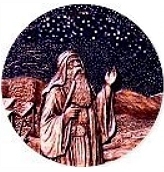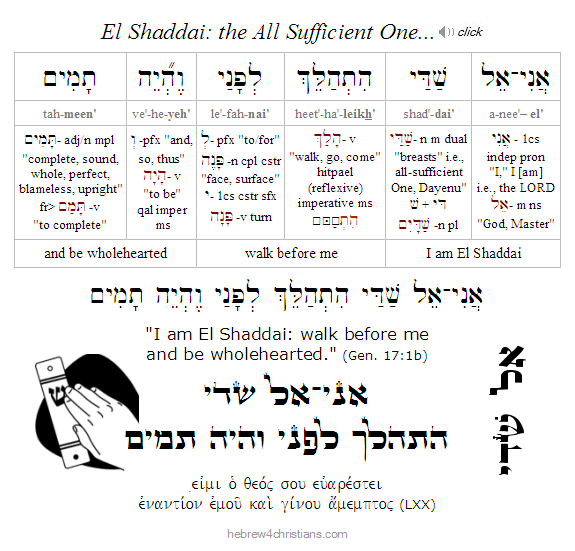|
In this week's Torah (Lekh Lekha), the LORD described Himself using the Divine Name El Shaddai (אֵל שַׁדַּי), often mistranslated as "God Almighty." In Genesis 17:1, YHVH said to Abram: "I am El Shaddai. Walk before me and be perfect." But why did the LORD choose to reveal Himself using this distinctive name to Abram?
Most English translations render El Shaddai as "God Almighty," probably because the translators of the Septuagint (i.e., the ancient Greek translation of the Old Testament) thought Shaddai came from a root verb (shadad: שָׁדַד) that means "to overpower" or "to destroy." The Latin Vulgate likewise translated Shaddai as "Omnipotens" (from which we get our English word omnipotent). In other words, the translators regarded this term to suggest that God is so overpowering that He is considered "Almighty."
אֲנִי־אֵל שַׁדַּי
הִתְהַלֵּךְ לְפָנַי וֶהְיֵה תָמִים
a·nee · El · shad·dai
heet·ha·leikh · le·fa·nai · ye·he·yeh · ta·meem

"I am El Shaddai:
walk before Me and be wholehearted." (Gen. 17:1)

Hebrew Lesson:
Gen. 17:1b reading (click):
According to the Jewish sages, however, Shaddai is a contraction of the phrase, "I said to the world, dai (enough)" (as in the famous word used in the Passover Haggadah, Dayeinu -- "it would have been sufficient"). God created the world but "stopped" at a certain point. He left creation "unfinished" because He wanted us to complete the job by means of exercising chesed (love) in repair of the world (tikkun olam).
Jacob's blessing given in Genesis 49:25, however, indicates that Shaddai might be related to the word for breasts (shadaim), indicating sufficiency and nourishment (i.e., "blessings of the breasts and of the womb" (בִּרְכת שָׁדַיִם וָרָחַם)). In this case, the Name might derive from the contraction of sha ("who") and dai ("enough") to indicate God's complete sufficiency to nurture the fledgling nation into fruitfulness. Indeed, God first uses this Name when He refers to multiplying Abraham's offspring (Gen. 17:2).
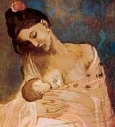
Understood in this light, the name El Shaddai provides a picture of God's nurturing love for our lives... God sustains us and loves us, like a mother loves her newborn child...
El Shaddai is used almost exclusively in reference to the three great patriarchs: Abraham, Isaac, and Jacob, and (according to Exodus 6:2-3) was the primary name by which God was known to the founders of Israel (the name YHVH given to Moses suggests God's absolute self-sufficiency, whereas the name Elohim suggests God's soverign power). The word "Shaddai" (by itself) was used later by the prophets (e.g., Num. 24:4; Isa. 13:6, Ezek. 1:24) as well as in the books of Job, Ruth, and in the Psalms. In modern Judaism, Shaddai is also thought to be an acronym for the phrase Shomer daltot Yisrael - "Guardian of the doors of Israel" - abbreviated as the letter Shin on most mezuzot:
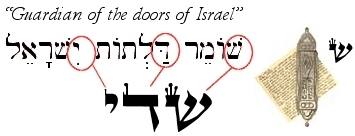 |
In connection with the Name El Shaddai (אֵל שַׁדַּי), we note that Abraham has more identifiable descendants than any other person in history... From the line of Isaac would come the twelve tribes of the Jewish people (as well as all those Gentiles who have been grafted into the covenantal blessings of Israel, i.e., the "church"), and from Ishmael would come the twelve tribes of the Ishmaelite people. Abraham also later married Keturah who bore him six more sons that became founders of six other nations of the Arab world, including the Midianites. To signify Abram's status, God changed his name from Avram ("exalted father" [from אָב, "father," + רָם, "exalted"]) to Avraham ("father of a multitude," a homonymic wordplay from אָב, "father" + המוֹן, "crowd"). Notice that some regard Avraham's name to mean "father of mercy" (from אָב, "father" + רחם, "womb").
Note: While the name El Shaddai presents a "feminine image" of the LORD, this is assuredly appropriate, since God created both genders as a reflection of His image, as it is written: "God created man in his own image, in the image of God he created him; male and female (זָכָר וּנְקֵבָה) he created them (Gen. 1:27). However, some people have made the dubious suggestion that El Shaddai should further be translated as "the many breasted One," even though such language suggests the abominable practices and idols common in various ancient fertility cults - customs that were later subject to the most severe judgment of God upon the seven Canaanite nations. It should be clear, in light of the overall context of the revelation given in the Torah, that the name El Shaddai is directly connected with the sanctity of the promise given to Abraham regarding the future growth of his family, and ultimately of the coming of the promised Seed, the Messiah...
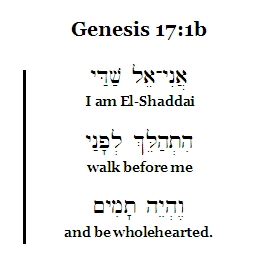 |
|


